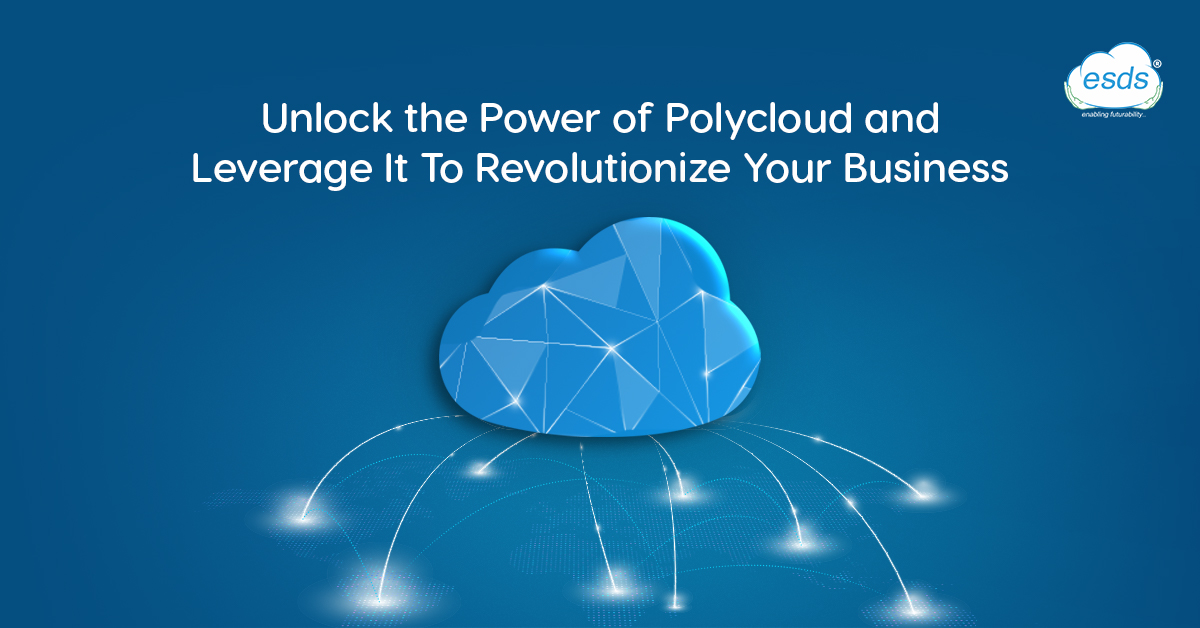Unlock the Power of Polycloud and Leverage It To Revolutionize Your Business
In today’s digital age, businesses are constantly searching for new and innovative ways to improve their operations and stay ahead of the competition. One such solution that has emerged in recent years is polycloud, a hybrid cloud computing approach that combines the benefits of multiple cloud services to create a more versatile and powerful infrastructure.

By harnessing the power of polycloud, businesses can access a wide range of services and resources from various providers, enabling them to customize their operations, optimize their workflows, and scale their resources to meet changing demands. In this context According to a report by MarketsandMarkets, the polycloud market is expected to grow from USD 684 million in 2020 to USD 3,438 million by 2025, at a compound annual growth rate (CAGR) of 38.2%. In this blog, we will explore the concept of polycloud in depth, examining its benefits, challenges, and potential applications, and discover how it can help revolutionize your business.
Introduction: What is Polycloud and Why Should You Care?

Polycloud is a relatively new concept in the world of cloud computing, but it is rapidly gaining popularity among businesses of all sizes and industries. At its core, polycloud refers to the practice of using multiple cloud services from different providers to create a more robust and flexible infrastructure. This can include a combination of public clouds, private clouds, and on-premises resources, all working together seamlessly to deliver a comprehensive and versatile computing environment. The benefits of polycloud are numerous, including increased agility, better scalability, improved security, and reduced costs. By leveraging the strengths of various cloud services, businesses can customize their operations to meet specific needs, adapt quickly to changing demands, and gain a competitive edge in their industry.
How Polycloud Can Help You Achieve Maximum Efficiency & Cost Savings?

One of the main advantages of polycloud is its ability to help businesses achieve maximum efficiency and cost savings. By combining multiple cloud services, businesses can take advantage of each provider’s unique strengths, while minimizing their weaknesses. For example, a company may use a public cloud service for data storage and a private cloud for sensitive data processing, thereby achieving the best of both worlds. Additionally, polycloud allows businesses to scale their resources up or down as needed, providing more flexibility and cost savings compared to traditional on-premises solutions. By leveraging the right mix of cloud services, businesses can reduce their infrastructure costs, optimize their workflows, and improve their overall efficiency. With polycloud, businesses can also minimize the risk of vendor lock-in, as they are not dependent on a single provider and can easily switch between services as needed. All of these factors make polycloud an attractive option for businesses looking to maximize their efficiency and cost savings while staying competitive in today’s fast-paced digital world.
The Benefits of Using a Cloud Management Platform for Your Business

As businesses increasingly adopt polycloud strategies, the need for effective cloud management becomes more critical than ever. A cloud management platform (CMP) can provide a centralized interface for managing multiple cloud services, enabling businesses to streamline their operations and optimize their workflows. With a CMP, businesses can monitor their cloud resources in real-time, track usage and costs, and automate routine tasks such as provisioning and deployment. This not only reduces the workload on IT staff but also minimizes the risk of errors and downtime.
A CMP can also provide advanced features such as resource optimization, compliance management, and security monitoring, helping businesses to stay in control of their cloud resources and mitigate potential risks. Additionally, a CMP can simplify the process of switching between different cloud services, enabling businesses to take advantage of the best available options for their specific needs. Overall, a cloud management platform can help businesses achieve greater efficiency, agility, and security, making it an essential tool for any organization looking to leverage the power of polycloud.
Here are some of the benefits of using a cloud management platform (CMP) for your business:
Increased efficiency: CMPs allow you to manage multiple cloud services from a single interface, streamlining workflows and minimizing manual processes.
Cost savings: CMPs help you optimize cloud usage, identifying opportunities to reduce waste and lower costs.
Better visibility: CMPs provide real-time monitoring and reporting of cloud usage and costs, helping you stay on top of your cloud resources and budget.
Improved security: CMPs offer robust security features, such as access controls and data encryption, to help protect your sensitive data.
Greater flexibility: CMPs enable you to easily scale your cloud resources up or down, depending on your organization’s changing needs.
Automation: CMPs automate routine tasks, freeing up IT staff to focus on more strategic initiatives.
Compliance: CMPs help you maintain compliance with industry and regulatory standards, reducing the risk of costly fines or legal issues.
Better collaboration: CMPs allow for better collaboration between IT, finance, and operations teams, ensuring everyone is aligned on cloud strategy and objectives.
What are the Best Practices for Implementing a Cloud Management Platform?

Implementing a cloud management platform (CMP) can bring significant benefits to businesses, but it’s essential to approach the process with care to ensure success. One of the key best practices for implementing a CMP is to start with a clear understanding of your organization’s needs and goals. This includes identifying the cloud services you plan to use, the workflows you want to optimize, and the key metrics you want to track. It’s also essential to involve key stakeholders from across the organization, including IT, finance, and operations, to ensure everyone is aligned on the objectives of the CMP implementation.
Another best practice is to choose a CMP that integrates well with your existing infrastructure and cloud services. This can help minimize the learning curve and reduce the risk of disruptions or downtime during the implementation process. It’s also crucial to establish clear policies and processes for managing your cloud resources, including governance, compliance, and security. Finally, it’s important to establish a system for ongoing monitoring and optimization of your CMP, including regular reviews of usage and costs, and adjusting your strategy as needed to ensure maximum efficiency and ROI. By following these best practices, businesses can ensure a successful implementation of a CMP and fully realize the benefits of polycloud.
How to Choose the Right Cloud Management Platform for Your Needs?

Choosing the right cloud management platform (CMP) is critical to the success of your polycloud strategy. When evaluating CMP options, there are several key factors to consider. First, consider the compatibility of the CMP with your existing infrastructure and cloud services. A CMP that integrates well with your current setup can help minimize disruptions and ensure a smooth transition. Next, consider the scalability of the CMP. Will it be able to meet your organization’s growing needs? Additionally, look for a CMP that offers comprehensive monitoring and reporting capabilities, as this can help you stay on top of your cloud usage and costs.
Another critical factor is security. Look for a CMP that offers robust security features, such as access controls and data encryption, to ensure the protection of your sensitive data. Finally, consider the level of support offered by the CMP provider. Will they provide ongoing training and support to help you get the most out of the platform? Do they offer responsive customer service in case of any issues or concerns? By taking these factors into account, you can make an informed decision when choosing a CMP that best meets your organization’s needs and goals.
Conclusion: Start Leveraging the Power of PolyCloud Today to Unlock New Possibilities

Polycloud is rapidly becoming the new standard for cloud computing, and for good reason. By leveraging multiple cloud services, businesses can achieve greater efficiency, agility, and cost savings than ever before. However, to fully realize the benefits of polycloud, businesses must also implement effective cloud management strategies. This includes choosing the right cloud management platform (CMP) and following best practices for implementation and ongoing management.
By doing so, businesses can take full advantage of the power of polycloud and unlock new levels of productivity and innovation. With the right CMP in place, businesses can monitor and manage their cloud resources in real-time, optimize workflows, and automate routine tasks, all while minimizing costs and risk. If you haven’t yet started exploring the possibilities of polycloud, there’s no time like the present. By embracing this new paradigm, businesses can stay ahead of the curve and position themselves for success in the ever-evolving world of cloud computing.
